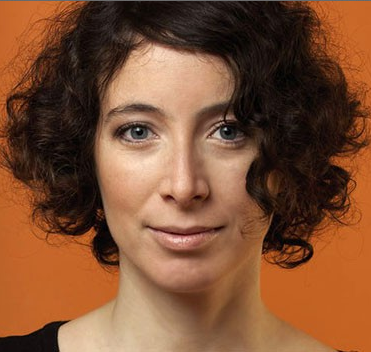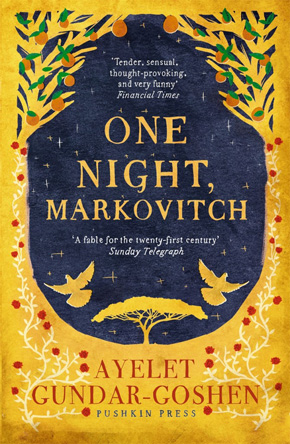Riding the dragon
by Ayelet Gundar-GoshenHow a routine ‘meet the parents’ made me write my first novel (and get mixed up with a whole village).
“Who lives in that house?” I asked my boyfriend the first time he took me to his parents’ village. The house behind the fence wasn’t especially dark or remarkably mysterious. There was no ivy on the walls, no bats were hanging from the roof, yet there was a kind of sadness coming out of that yard, where other yards had the voices of children coming out of them, or the smell of barbecue.
“Beautiful Bella,” he replied.
I gave him the look a girl gives her boyfriend when he calls another girl beautiful, and he immediately added that Bella is 80 years old, and the most miserable woman in the village.
“Why miserable?”
Immediately all eyes lit up. Nothing better than other’s misery to give fuel to a dying conversation. Apparently Bella was not just beautiful. She was really beautiful. The kind of woman that makes robins fly backwards. Turtles run forwards. Men freeze. But of all the men that froze still – and there were many – she was destined to marry the most worthless man in the village.
That was the first time I heard of the heroic operation that went terribly wrong. It happened more than sixty years ago, but everyone in the village held onto the story like other villagers cling to famous recipes or secret wines. I discovered that during the Second World War a group of Jewish farmers left Mandatory Palestine for Europe. Their plan was to fictively marry Jewish girls who weren’t allowed into Israel under British law. These marriages of convenience would save the girls from Nazi Europe and smuggle them in under British noses. Marriages were transformed from a symbol of love, the most intimate and private emotion, to a national enterprise. Once in Israel, all parties would divorce and go on with their lives.
The history books glorify this operation, but none of them happens to mention the case of Beautiful Bella, married to a farmer who was so transfixed by her that he refused to let her go when they reached home. He held her against her will, under the power of a religious law that law persists in Israel to this day: once married religiously, a woman can’t divorce without her husband’s permission. If he doesn’t give permission, she’s forced to stay married. She can’t marry another man, and should she have another man’s babies they are considered bastards, excluded from the religious community.
Instead of condemning this man, I tried to understand him. I wondered what makes one person hold another person – or another country – by force.”
At this point the usual response is to shout “villain!” That’s what I did when I heard about this for the first time. But then the psychologist in me sprang into action. Instead of condemning this man, I tried to understand him. I wondered what makes one person hold another person – or another country – by force. Something that does not belong to you. I tried to find the same place within me that holds onto things and cannot let go, whether from a sense of great passion or great offence. I thought of all those who refuse to let go of something, in the dim hope that if they only hold on strongly enough, this something will be theirs.
Deciding to write a novel isn’t much different from deciding to ride a dragon. There’s this huge scary thing in front of you, and instead of running away you’re supposed to jump on his back. He’s bigger than you, he has these huge wings, and you need to work out how to control him fast, or he’ll kick you off. The unfortunate thing about dragons and novels is that just because you were able to stay on their back once, it doesn’t necessarily mean you’ll be able to do it again
When the book won the Sapir Prize for best debut, I was invited to give a lecture at a nursing home close to the village. Naïve and arrogant, I was certain I’d enjoy a pleasant talk with a group of charming grannies. It turned out to be an ambush. The old villagers were furious at the literary freedoms I took with the story. True, they’re the ones who told me Bella used to sleep around with half the village in order to aggravate her husband – but they didn’t expect it to be printed. I was reminded of the saying that telling a writer a secret is like hugging a pickpocket: what was yours is soon gone. And yet I wondered: had I gone too far with the story? I changed the names and the places, no outsider would know. But the village knew, Bella knew.
 Ayelet Gundar-Goshen was born in Israel in 1982. She holds an MA in Clinical Psychology from Tel Aviv University, has been a news editor on Israel’s leading newspaper and has worked for the Israeli civil rights movement. Her film scripts have won prizes at international festivals, including the Berlin Today Award and the New York City Short Film Festival Award. One Night, Markovitch is out now in paperback from Pushkin Press. Read more.
Ayelet Gundar-Goshen was born in Israel in 1982. She holds an MA in Clinical Psychology from Tel Aviv University, has been a news editor on Israel’s leading newspaper and has worked for the Israeli civil rights movement. Her film scripts have won prizes at international festivals, including the Berlin Today Award and the New York City Short Film Festival Award. One Night, Markovitch is out now in paperback from Pushkin Press. Read more.
Author portrait © Nir Kafri


